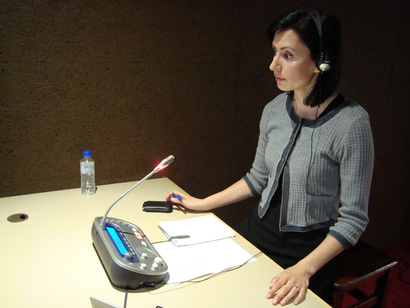|
Your interpreter arrives at your event ready to go. She is a professional, has years of experience doing similar events, and knows her stuff. You, on the other hand, are an unknown quantity. The interpreter needs to discover quickly if you are comfortable presenting in front of a large audience. Do you largely make up your speech as you go along, do you read it verbatim, or are you somewhere in between? Do you interact a lot with your audience or not? Every speaker is different and every day on the job for an interpreter is an exciting new challenge.
Here are some tips for how to work with your interpreter: 1. If you are a native English speaker and your audience speaks Spanish, do not try to rely on your high school Spanish skills to make a connection with the audience. Even if you are fairly fluent in Spanish, you should do your whole speech in English and let your interpreter do his job. It can be confusing for both the audience and the interpreter if you switch back and forth. Plus, your second language skills may not be as good as you think they are, which could cause confusion and potentially be embarrassing. 2. Limit the amount of jargon, acronyms, and abbreviations in your speech. This should be true anyway, unless you're speaking in front of a group that is really immersed in your world. Not only is the audience unlikely to follow jargon and acronyms, but your interpreter will have a difficult time getting your meaning across. At the very least, try to provide a list of industry or organization specific terms to your interpreter before the event, so she is ready when you start peppering your speech with them. 3. If your interpreter is in a sound booth, be sure you are talking into the microphone at all times, but not getting too close. If you have a fixed microphone on stage, like behind a podium, and you walk away, the interpreter may not be able to hear you. Likewise, if you suddenly, boom into your microphone, you might knock off your interpreter's ears! 4. If you have a sign language interpreter, do not walk in front of him! You wouldn't believe how often this happens. If you do it, your audience won't see what you're talking about. 5. Speak normally. Don't try to compensate for your interpreter. You have hired a professional whose job it is to keep up with you and work at your pace. If it's consecutive interpretation, than yes, you will need to pause and let your interpreter interpret, but you don't need to slow your speech. Same goes for simultaneous interpreters. They will keep up with you. You need to focus on speaking at a pace that your audience can follow. Professional interpreters will have no problem keeping up. 6. Jokes should be limited, or, as with jargon, you should at least supply your interpreter with your jokes ahead of time. Humor is notoriously hard to convey in a different language. Often the interpreter will have to completely re-work jokes to get the point across. Interpreters, in desperation, have even been known to tell the audience, "he told a joke, you should laugh now," when it's impossible in the moment to appropriately interpret it. If you share your jokes with your interpreter ahead of time, she can adjust it to the foreign language and everyone's amusement. By keeping these six tips in mind, you will be sure to have a great experience with your interpreters. Professional interpreters have extensive training and are great at thinking and reacting to unexpected situations. So relax, concentrate on your audience and on your delivery, and let your interpreters do their job.
0 Comments
If you've localized your website for your international markets, you've taken a good first step toward tapping your global customer base. But online competition is becoming fiercer and your marketing has to get even more sophisticated in order to compete effectively. As this Multichannel Merchant article reports, in countries outside of the U.S. there are (gasp) other popular search engines besides Google, and they use different algorithms to serve up top search results. For example, if you're marketing in China, you'll need to optimize for Baidu which has nearly 60% of the market.
Additionally, you need to pay close attention to your SEO terms. Hire a professional translator to ensure that you correctly translate your key words and ask them to think broadly about what words the local market uses. In the same MCM article, they cite a French example where a chocolate sweet roll is usually called a pain au chocolat, but in the southwest it's called chocolatine. You'll encounter the same issues in Latin America, where English words translate very differently depending on country and region. For example, green beans can be translated to habichuela, chauncha, vainita, or ejote depending on the region. If you happen to be peddling green beans, the SEO words you choose could have a huge impact on your search ranking. Think about the U.S. market. In some areas you would order a sub sandwich, but across the country we also have hoagies, grinders, heroes, and spuckies. If you use the wrong term for your market, you won't get nearly so many customers. If your product is trendy, you'll have to be even more aware of what terms local consumers use. Keep a close eye on social media for each market and adapt your strategy to the local terminology.
 After studying 50 million tweets, linguists gained amazing insights into Spanish dialects. Through maps overlaid with demographic information, they could see the distribution of the dialects was affected by rural vs. urban areas, and that immigration played a major role in both the spread and containment of dialects. |
Author
Archives
March 2024
Categories
All
|
Photos from : : Ys [waiz] : :, bjahind, fabola, MattysFlicks, @sage_solar, LoS, Traducción e Interpretación, Kyle Taylor, Dream It. Do It., _gee_, keepitsurreal, One Way Stock, Airviewsphotos, GotCredit, efile989, Benoit cars, ** RCB **, stephiesal853, Francisco Anzola, Highways England, ITU Pictures, VIPevent, leoplus, Karsten Bitter, Jolante, jobstop11, Nguyen Vu Hung (vuhung), jurvetson, mikefats, YooSan, sandrafdzh, roland, mikecogh, y entonces, Donald Lee Pardue, Gatorgoon, daniel0685, BÜNDNIS 90/DIE GRÜNEN, rick, {Guerrilla Futures | Jason Tester}, mikecogh, markyharky, amslerPIX, jo.sau, IAEA Imagebank, lisa-skorpion, Toronto Public Library Special Collections, Wootang01




 RSS Feed
RSS Feed
